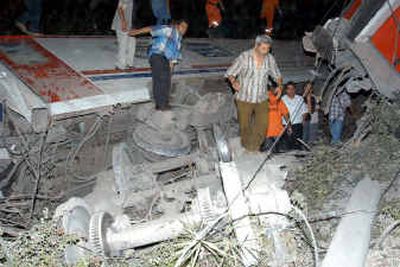High-speed train derails, killing dozens in Turkey

ANKARA, Turkey – At least 37 people were killed and scores of others were injured Thursday when a high speed train traveling from Istanbul to Ankara derailed.
Witnesses said the train spun out of control at a bend near the township of Pamukova 113 miles east of Istanbul. At least four of the train’s cars piled on top of the other then fell to their sides.
Transport officials said the train was almost full with 234 passengers on board.
Turkish news channels showed rescue teams digging under the cars in search of victims. The wounded, many of them children with bloody faces, were rushed to nearby hospitals.
“There are decapitated heads, limbs all around, it’s a bloodbath,” said Pamukova Mayor Feridun Turan, who had rushed to the scene.
“We were flung into the air, then the car fell sideways, people were screaming, there was smoke and shattered glass everywhere,” said Elcin Ozumturk, a doctor who survived the accident with his wife. “We broke a window and crawled out. Thanks to Allah that we are still alive.”
The cause of the accident remained unclear, though transport officials said mechanical failure was likely to blame.
Masum Turker, the head of a crisis center, said sabotage was not being ruled out. “We are examining all the possibilities,” Turker told a news conference.
Within hours of the crash Turkey’s ruling Justice and Development Party was being accused by opposition politicians and transportation experts of launching the high speed service last month without adequately upgrading the tracks.
“The tracks are not physically strong enough to deal with such trains,” Haluk Gercek, an academic at Istanbul Technical University. “Unfortunately our warnings went unheeded.”
Much of Turkey’s rail network, which was built in the 1890s under the country’s former Ottoman rulers, is antiquated, compared to its highly modern highway system. Most Turks shun the rail system and prefer to travel by road.
The private NTV news channel rebroadcast footage of a June interview with another transportation expert, Aydin Erel. “The tracks are not secure, I would never ride that train,” Erel had said.
But Turkish Prime Minister Recep Tayyip Erdogan, who canceled a trip to Bosnia to travel to the crash site, rejected those claims. “We carried out the necessary studies (before launching the service and) the system is safe,” he said.
The head of Turkey’s state rail system, Suleyman Karaman, said the train, named after an early 19th century Turkish author, Yakup Kadri Karaosmanoglu, had been traveling at a slower speed when the crash occurred. “The accident is not linked to high speed,” he said.
Several survivors disputed that claim.
“The train was going really fast and went out of control,” survivor Oguz Sarisin told NTV from his hospital bed.
“I saw the speedometer on the wall of the restaurant car just 15 minutes before the crash,” said another survivor, Abdullah Cagiridiken. “The dial was pointing to 132 kilometers.”